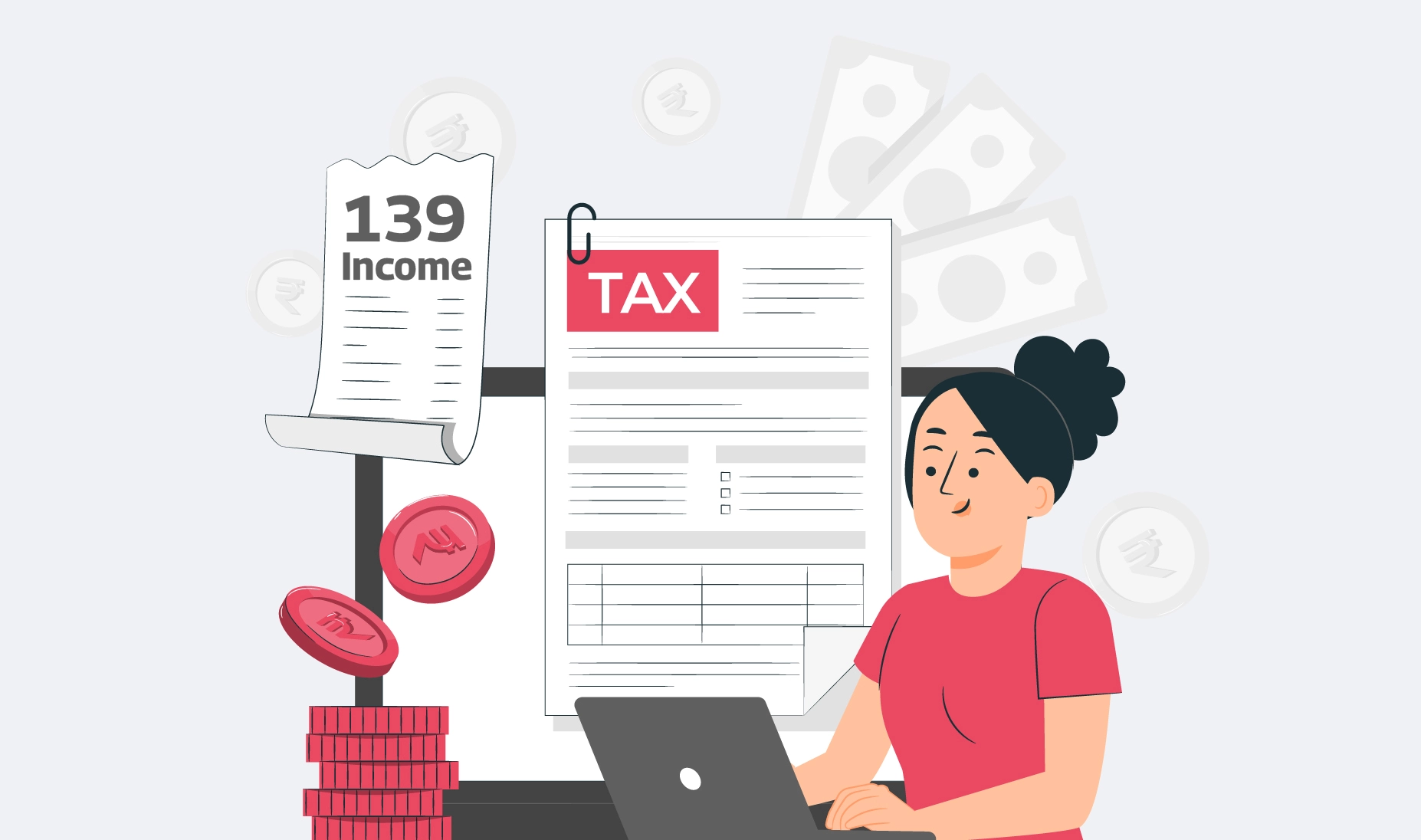Seventh Proviso to Section 139(1) of Income Tax Act – Know Applicability, Due Dates & Return Filing

Taxpayers should know more about Section 139(1) of the Income tax act since it is the section under which they have to file their returns if they have missed filing within the due date.

- Learning more about Section 139(1)
- Section 139(1) of Income Tax Act Due Dates
- Mandatory Returns Section 139(1) of Income Tax Act
- Seventh Proviso for the ITR Section 139(1)
- Those required to file ITRs under the Seventh Proviso
- What transactions come under the Seventh Proviso?
- ITR Filing Procedure under 139(1)
- Other Sub-Sections of Section 139 of the Income Tax Act 1961
Overview of Section 139(1) Seventh Proviso of Income Tax Act
Filing income tax returns is mandatory if your annual income surpasses Rs. 2.5 lakh as per the prevailing tax rules. Section 139(1) is a vital component of the ITR. People missing out on their due date for filing returns have to use this section for filing their ITRs. Here are some of the main provisions covered under the Income Tax Act’s Section 139(1):
- Compulsory and voluntary income tax returns.
- ITRs filed by charitable and religious organizations.
- ITRs filed in case of any losses.
- Revised ITR filing.
- ITR filing of political parties and entities seeking exemptions under Section 10.
- ITR filing by investment funds, business trusts and defective IT returns.
Section 139(1) of Income Tax Act Due Date
Those who do not require auditing or assessing of their books of accounts should file ITRs by the 31st of July for each assessment year. This category includes the following types of filers:
- Consultants.
- Salaried professionals or employees.
- Freelancers.
- Self-employed or professional individuals.
Those having their books of accounts audited should file by 30th September each year. This category includes companies, self-employed individuals or professionals, working partners at firms/companies, and consultants. If you fall in this category, make sure that you keep the last date in mind and abide by all the provisions of the same.
Section 139(1) of Income Tax Act – Mandatory Returns
The section covers both voluntary and mandatory IT returns. The following categories are required to file compulsory ITRs:
- Private, public, domestic or foreign firms/companies situated in the country or doing business here.
- Any person with total income surpassing the maximum limit for exemptions.
- All firms including Unlimited Liability Partnerships and also Limited Liability Partnerships or LLPs.
- Any Indian resident with assets situated outside India including financial shareholding of any foreign company.
- Any Indian resident with the signing authority for any account outside India.
- Any association of persons or AOPs, BOIs or bodies of individuals, and HUFs or Hindu Undivided Families.
As per the Section 139(1) of Income Tax Act, individuals or companies are not compulsorily required to file returns under the voluntary returns plan. Even if they file returns voluntarily, they will be taken as valid ITRs.
Seventh Proviso to Section 139(1)
The Indian Government has integrated new guidelines for tax return filing under this section. This was the seventh proviso to section 139(1) and was implemented on 1st April, 2020.
Certain categories of entities or people will have to file ITRs even while falling in the threshold for exemption, in case they undertake transactions of higher values. Now that you know what is 139(1) in income tax returns, you should read on for information on a few more aspects.
Key Changes in ITR forms for the Assessment Year
ITR 1 to ITR 7 are the new forms of ITR which were introduced with added schedules and columns. The new format makes it easy to fill up the necessary details while filing ITR. These new amendments are significant to the revised Income Tax Act:
- Modifications in ITR-V (Form of Acknowledgment) for the 2020-21 Taxation Year
Both the unverified and verified forms have been changed by the Department of Income Tax. All the essential details (e-filing data) about the taxpayer can be seen in the new form of ITR V. It will not have any details of deductions, total income, taxes, etc. Once the form has been verified, the person who was assessed may download the final ITR-V.
- Rule 12 in connection with ITR-1 and ITR-4 or Sahaj and Sugam respectively have been modified via Notification No. 31/2020 for 2020-21 AY
Under this rule, the joint owners of residential property can file ITR-1 and 4 in case they can show a return of income or ROI under the 7th proviso to section 139(1).
Those required to file ITRs under the Section 139(1) Seventh Proviso
- BOIs
- HUFs
- AOPs
- Individuals
- Artificial juridical persons
What transactions come under the Section 139(1) Seventh Proviso?
There are many types of transactions which have coverage under this Act. They include:
- Total foreign travel expenditure surpasses Rs. 2 lakh.
- Total current account deposits surpass Rs. 1 crore in either one or multiple accounts.
- Payment of electricity bills surpassing Rs. 1 lakh. However, this is only applicable for the taxpayer himself or herself and not if he or she is paying bills for others in the family.
- Other transactions of higher values as per the guidelines of the CBDT (Central Board of Direct Taxes).
Hence, the provisions of this Section 139(1) are different from Section 139 (9) of Income Tax Act.
What are the High-Value Transactions Covered under the 7th Proviso to Section 139 (1) of the Income Tax Act, 1961?
It is compulsory for an individual to furnish income tax returns if the person has not undertaken any of the below-mentioned high-value transactions during a financial year –
1. If the collective deposits in his/her current account (accounts) exceed INR 1 crore
So, in case the aggregate amount placed into the current account(s) upheld by a person with any co-operative societies and bank(s) is equal to or more than INR 1 crore, the person has to furnish an income tax return under the 7th Proviso to Section 139 (1). The deposits can be of any mode like cheque, cash, online transfer, and so on
2. If the collective expenditures on travel abroad exceed INR 2 lakhs
If a person has incurred an expenditure that comes to an aggregate of INR 2 lakhs and beyond on travel done across borders to a foreign land, he/she is required to file the income tax return under 7th Proviso to 139 (1) Section of IT Act, 1961. In this case, the travel expenses incurred on travel abroad can be for your own self or for another person.
3. If the collective expenditure towards electricity consumption exceeds INR 1 lakh
If a person has incurred costs that aggregate INR 1 lakh or beyond towards paying electricity bills, he/she has to file an income tax return under the 7th Proviso to Section 139 (1). However, this condition is fulfilled only if it covers the consumption costs of electricity as consumed by the person concerned.
Income Tax Act’s 7th Proviso to Section 139 (1) applies to other high-value transactions as well that are prescribed by the Central Board of Direct Taxes.
ITR Filing Procedure under Seventh Proviso to Section 139(1)
- In the ITR form, under Part A-General Information, there is a column containing this question- Are you filing a return of income under the seventh proviso to Section 139(1) but otherwise not required to furnish return of income?
- You can either click yes or no, depending on what is applicable to you.
Other Sub-Sections of Section 139 of Income Tax Act 1961
2) Section 139(3) – Filing ITR in case of Loss
- If an individual taxpayer incurs any loss in the previous FY, it is not mandatory for them to file a tax return
- It is mandatory for firms and companies to file ITR for loss in the following cases:
-
- If the incurred loss is under the category of ‘Profits and Gains of Business and Profession’. Or if it is under the category of ‘Capital Gains’. ITR is compulsory if firms wish to carry forward the loss with future income. This option is available if the ITR showing the loss is filed within the due date
- If loss comes under the category of “House or residential Property”, it could be carried forward
- Loss filed for ITR under Section 142(1), (except “House property” loss) cannot be carried forward
- Loss that is offset against income in another category in the same FY is allowed to offset
- Any loss of the previous years can be carried forward in case the returns were filed within due dates
3) Section 139(4) – Belated or Late ITR
The taxpayer irrespective of whether an individual or a firm has to furnish ITR before the due date as mentioned under Section 139(1).
However, in case the taxpayer fails to do so, they can file the return late for a previous year before the expiry of the year or before the conclusion of the assessment year.
However, in this case, the taxpayer may have to pay a penalty of INR 5,000, u/s 271F if the ITR is submitted after the relevant assessment year. No penalty is imposed if the income does not require any mandatory filing as per section 139(1).
4) Section 139(5) – Revised ITR or Return
If the ITR was filed on time but the taxpayer later realizes a mistake in the filing, you can correct it as per the revised return of IT Act u/s 139(5). However, you cannot revise a return that was filed beyond the scope of this section.
You can file a revised return at any time within a year of the assessment or before the completion of the assessment. No restriction is there in terms of the number of times that an ITR can be revised within the given time frame.
Moreover, you can make changes to the original ITR form or a different return form. Once you file the latest return u/s 139(5), the original return filed u/s 139(1) is considered to be withdrawn and the revised return is validated.
Revised Return is generally permitted in case of mistakes done accidentally. Section 139(5) especially applies to ‘Omissions and Wrong Statements’ and not to ‘Concealment or False Statements’. In case of any intentional omissions/mistakes done for fraudulent purposes, a penalty is imposed on the taxpayer.
5) Section 139(4a) – ITR of Charitable and Religious Organizations
ITR filing u/s 139(4A) is required by individuals who get an income from the property held by a trust or any legal obligation. This can be either for charitable or religious purposes wholly or partly.
6) Section 139(4b) – ITR furnished by Political Parties
As per section 139(4b), political parties can file ITR if the total earning exceeds the tax-exempt limit permitted. In such a case, the total earnings calculated under this act exclude the effects of provisions under Section 13A.
7) Section 139(4c) and Section 139(4d) – ITR of firms claiming Exemption U/S 10
Section 139(4c) and 139(4D) especially deal with firms that claim benefits as per Section 10 of the IT Act. ITR u/s 139(4c) comprises institutes that mandatorily need to file ITR if their annual earnings exceed the permitted exemption limit excluding other benefits of exemption availed by the institution.
Below institutions are required to file return u/s 139(4C):
- Associations that are involved in scientific research
- Institutions mentioned under Section 10(23A)
- News agencies
- Institutions referred u/s 10(23B)
- Universities, educational institutions, hospitals, etc.
Further, a return u/s 139(4d) is applied in the case of colleges, institutions, and universities that do not require filing ITR and loss in this section under any other provision.
Section 139(4d) applies for Section 35(1)(ii) and Section 35(1)(iii) of income tax.
8) Section 139(4f)
All funds of investment mentioned u/s 115UB that are not required to provide a return of income or loss under this section should show the ITR as per the income or loss in the previous year.
9) Section 139(9) – Defective ITR
A tax return is regarded as defective u/s 139(9) if the taxpayer doesn’t attach some important documents while filing the return.
If the ITR is termed defective by the tax officer, the taxpayer will be informed and will be allowed to rectify the same within 15 days of intimation. This period could further be extended if the taxpayer requests the same. The assessing officer informs the taxpayer about the defect through a letter.
The following documents are necessary to avoid your filing to be deemed as defective:
- ITR form duly filled in the suggested procedure
- A statement demonstrating the calculation of taxes payable
- Proof of paid tax claims such as TDS, advance tax, self-assessment tax, etc.
- Audit report as per section 44AB, where you have to furnish a report before filing the return
- Mandatory copies of account books maintained by taxpayers such as:
-
- Account of profit & loss, Account of manufacturing, trading and balance sheet, and account of income and expense
- Partners’ personal accounts if it is a partnership firm
- Personal accounts of the members of AOP and BOI
- Personal account of proprietors
- If the account of a taxpayer is audited, you need to furnish copies of audit reports, balance sheets, and audited accounts of profit and loss
- The relevant reports of a Cost Audit
- If the account books of taxpayers are not maintained, they need to furnish statements mentioning gross receipts, expenses, net profit, turnover amount, bank balance, stocks, cash, debtors & creditors information, etc.
FAQs: Section 139(1) of the Income Tax Act Seventh Proviso - Applicability, Due Dates & Return Filing

Author Bio
Paybima Team
Paybima is an Indian insurance aggregator on a mission to make insurance simple for people. Paybima is the Digital arm of the already established and trusted Mahindra Insurance Brokers Ltd., a reputed name in the insurance broking industry with 17 years of experience. Paybima promises you the easy-to-access online platform to buy insurance policies, and also extend their unrelented assistance with all your policy related queries and services.
Other Life Insurance Products
Latest Post
In a country where medical inflation is rising rapidly, securing a comprehensive health coverage plan for the entire family is no longer optional, it is essential. Selecting the right health insurance requires careful evaluation of multiple factors, not just premium costs. A well-chosen plan ensures financial security, access to quality healthcare, and peace of mind during medical emergencies.


Term insurance is an important investment. However, with the availability of so many insurers offering term plans, it becomes difficult to select the best term plan to suit your needs. Buying a term plan needs some consideration and research on the part of the policyholder. In this post, let us discuss the best term insurance providers in India.


Have you ever caught yourself lost in illusions about your daughter's future events, such as her university convocation and first day at work? Her university convocation. When she embarks upon her initial job after graduation will be the day.

.png)
When you sign up for a life insurance policy - whether it’s a traditional term insurance policy or a ULIP – you are not just buying peace of mind. You are also trusting the insurer with your money. So naturally, you would want to know: How is that money being managed? And more importantly, how is it being protected from risky decisions?

.png)
Globally, 20th October marks the day to observe World Osteoporosis Day. Do you know the significance of observing Osteoporosis on a global platform? Do you know how this condition affects people and their lives? Let us find out in this post!




